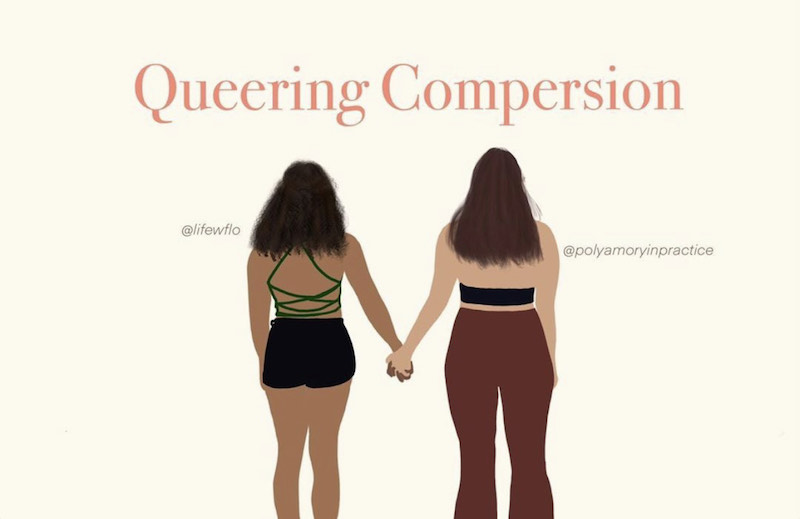Coined in the 1990s by the Kerista community, compersion is the act of feeling joy and excitement for the happiness of others (partners and non-partners). Compersion was welcomed into the polyamorist community as a way to explain the joy we felt from our partners engaging in new relations.
Currently, in media and polyamory spaces, Compersion is usually regarded as full and unhesitant happiness for your partner(s’) romantic and/or sexual interactions with others.
Imagine this: You’re in the living room, dinner made, and your partner comes home after they’ve been on a date. They proceed to tell you all about the wonders of their new romance, and the only thing you feel is pure joy for them. That is how our community regularly describes Compersion.
Except many people don’t feel pure unclouded joy for their partners. But many people DO feel the pressure to attain perfect Compersion in these instances.
This is because of mononormativity, the societal standard, and institutions that only acknowledge monogamous relationships. See, during European expansion, European forces utilized Christian tradition to institutionalize certain ideologies that aligned with their beliefs. During the violent colonization of indigenous lands, the foundations of America were created. The foundation was based upon ideals of capitalism, white supremacy. Amidst that were the institutionalized laws and practices that America believed would allow Capitalism and White Supremacy to progress. One of these practices remains today, and that is the construction and lawful prioritization of monogamy. A prioritization that assumes monogamy as the best way for relationships, families, and societal systems to function.
Deeply rooted in our current society is the idea that we are and should be the sole providers and lovers for our (1) partner. When we challenge this idea with polyamory, we actively resist these norms, and that resistance through polyamory can lead to jealousy, fear, and a host of other insecurities. The catch is: society assumes we wouldn’t face these struggles in lifelong monogamous relationships.
Working through these feelings can be especially challenging when many of our polyamorous peers talk about feeling nothing but utter joy for their metamours and partners. This continual comparison to other relationships and the inherent assumption that compersion is the final destination (i.e., you are the best polyamorous version of yourself when you feel nothing but compersion) actually harms the process of enjoying polyamory.
How so?
Well, Compersion is often described as “the opposite of jealousy.” This rhetoric limits and bounds Compersion into something that is the direct opposite of the uncomfortable. If we assume that the uncontrollable feeling that is jealousy is unable to be had while feeling Compersion, we assume that feelings can only be felt individually. This idea of Compersion then takes on the “all or nothing” approach: feel it or be a bad/wrong polyamorist.
Viewing Compersion this way also assumes that non-monogamous folks have to (at some point) feel only compersion in order to sustain non-monogamy. When we view it this way, Compersion becomes this finish line with an impossible beast of a race track. How would we feel Compersion when our idea of it is extreme, unattainable, and binaried?
The answer is we wouldn’t. If we keep viewing compersion this way, we will continue to limit the ways we feel it — making it unreachable.
What we propose is a different outlook on compersion.
Recently my co-author Alexa Douros (she/her) and I (Flo Oliveira They/them) met at a local queer coffee shop and discussed just this. Sitting amidst many folks in our community, we shared our polyamory journeys and the struggles we had encountered with jealousy, comparisons, and metamours. This was when we found ourselves able to relate to struggling with the unrealistic pressures of compersion. As aforementioned, compersion is often represented as unhesitant, absolute joy for your partner. Not only that, but it is also highlighted as a polyamorous person’s finish line; once you master compersion, you’re told you can master anything polyam-related.
We couldn’t help but think about those polyamorous folks who don’t experience immediate, outright joy for their partner(s)’. Does this mean they aren’t experiencing compersion? What about those who experience only a moment of excitement, followed by a lot of jealousy and discomfort? What about those who just feel neutral about their partner(s)’ experiences?
Our current understanding of compersion leaves these folks out. Our current understanding of compersion boxes compersion into two feelings: joy and excitement. However, this is problematic as the human experience and human emotions are vast and complex unbinaried systems. Just as relationship dynamics are fluid and ever-changing, so is the experience of compersion.

Our model suggests that compersion doesn’t have to only be about extremely positive feelings. Compersion is not a container of joy that erodes at the sight of jealousy. Compersion is an open and fluid system that invites joy, excitement, jitters, pleasure, comfort, contentment, neutrality, anxiety, and/or any combination of those emotions, among others. Queering compersion looks like accepting compersion is not only happiness and joy but also comfortable neutrality.
It should also be noted that although we represent each possible emotion in circles, we imagine them as fluid bubbles that vary in size. We imagine them floating around and actively being reconstructed to fit each unique experience. We imagine each person as the owner of defining and redefining their emotion bubbles.
As discussed, feeling “purely positive” compersion can be a challenging and unattainable experience. We may experience neutrality, nerves, jitters, passion, or any other combination of feelings when our partners discuss their newfound loves. Either way, embrace all those feelings, even if they are neutral. Your current version of Compersion is the best version you can attain at that moment — and all of the emotions that come with it are valid.




